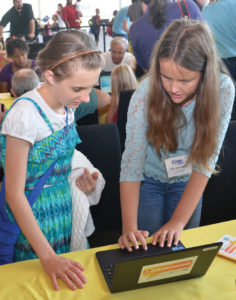
© 2016 by Steve Brawner Communications, Inc.
Gov. Asa Hutchinson stood before the assembled students at the Benton High School auditorium and asked for a show of hands: How many were interested in a career in computer coding? What he described as a “smattering” raised their hands.
So then the 65-year-old governor proceeded to tell the teenagers why computers are important. Farmers use software to determine how much to water their crops, he said. Manufacturing is now done by robots controlled by computers. When he was an undersecretary at the Department of Homeland Security, computers predicted potential terrorist attacks at ports so millions of containers didn’t have to be searched one at a time. He also showed the students a code.org video featuring a bunch of old guys, including Bill Gates, 60, and Facebook founder Mark Zuckerberg, 32, talking about coding. When he asked for another show of hands at the end of his presentation, more hands were raised.
Benton High was the first stop among several where the governor is encouraging students to take the computer science classes he and legislators now require schools to offer. He said afterwards that he is trying to help students understand “the connection between their technology that they live by, and how that technology comes about.”
Arkansas is the first state to teach computer science in every public high school, leading “Wired” magazine to publish an online article headlined, “So, Arkansas is leading the learn to code movement.” The idea came when Hutchinson was running for governor in 2014 and his 11-year-old granddaughter built a smartphone application for his campaign. Hutchinson pledged to require every high school in Arkansas to teach computer science and then signed it into law in 2015 after he was elected. Students taking the course receive a core math or science credit.
During the past school year, about 4,000 students took computer coding classes, many of them through the state’s online Virtual Academy because so few teachers were trained in coding. Meanwhile, the state spent $5 million partly to train teachers to give in-person instruction. At Benton High, 28 students are taking the class this year under teacher Lauren Roseberry, compared to the 15 who took the course last year online.
Meanwhile, Arkansas is on pace to be one of three states where every public school is connected to high-speed internet by July 2017.
At one time, Arkansas’ economic development strategy might best be described as “Come to the home of everyday low wages.” The state has attracted manufacturers because it doesn’t have much of a union presence. In the past, empty spec buildings were built so companies would have a place to land. And, of course, like all states Arkansas still generously pays companies to locate here through taxpayer-financed subsidies and tax credits.
Globalization and automation make all of that much less effective. At first, there was always someone overseas willing to work cheaper. Now, the factories are starting to come back to America, but not so many of the jobs; the people have been replaced by robots.
A coding job, meanwhile, requires only a computer, a high-speed internet connection (still a problem in some places in Arkansas), and a place to sit down – be that in an office, a coffee shop or a spare bedroom. State and local governments don’t have to build roads or rail spurs or worry about permits from the Environmental Protection Agency. Many startups get off the ground without requiring taxpayer-financed incentives.
Software developers earned a median wage of $100,690 in May 2015, according to the Bureau of Labor Statistics. According to code.org, there are currently 526,000 computing jobs open – 1,701 in Arkansas.
That’s where the jobs are – or a lot of them, anyway – not the 1950s factory work that’s never coming back no matter which presidential candidate Americans elect to re-negotiate those “unfair trade deals.”
Arkansas is a cheap place to live, and it has some nice scenery. The jobs will come here or, better yet, be created here, as long as the talent is available. How to create that talent? Encourage students to stop merely looking at their screens, and start exploring what’s behind them.